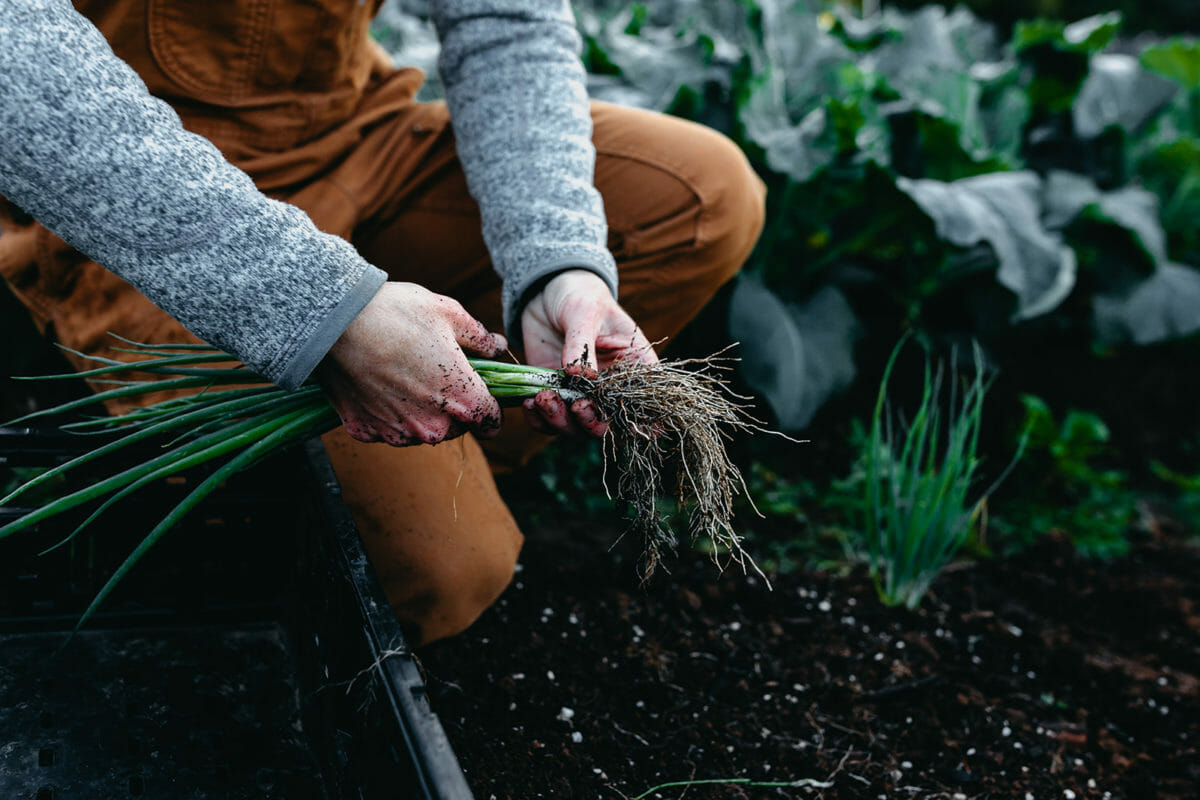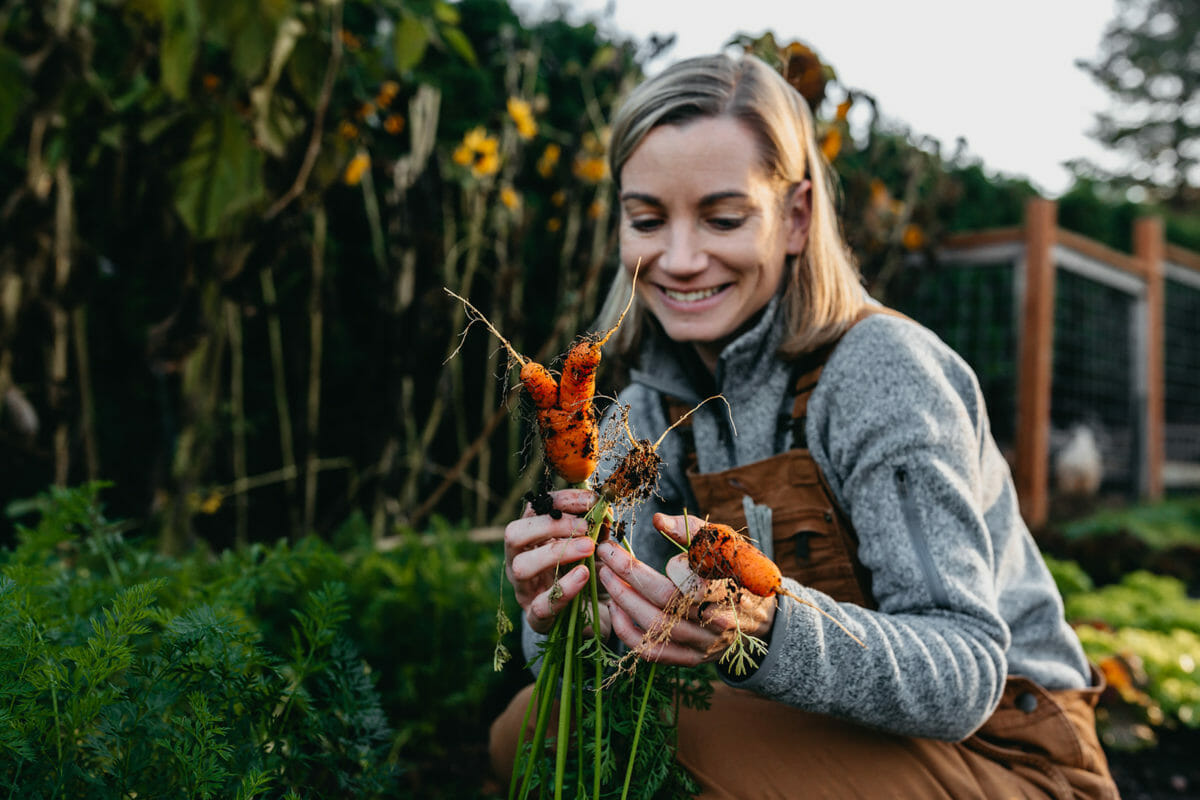Year One
The first installment in a series about becoming a farmer.

Jen Browning started her farm in 2019.courtesy of Juniper Layne Farm
Before the pandemic hit, Modern Farmer spoke to farmers who had completed their first year of farming and were gearing up for their second season. They told us about some of their biggest challenges, how they overcame them, and why it was all worth it in the end.
Here are some of their stories, which we’re sharing in a series in the hope they can help those thinking about quitting their desk job to jump into farming.
For new farmers, simply making the decision to start a farm can be one of the hardest steps to take. It’s no secret that farming is incredibly tough work, and there’s a lot of risk involved in quitting a steady job to launch your own business.
Jen Browning got the opportunity to make that decision when she took a leave of absence from her desk job working in the nonprofit social services sector in Seattle to foster twin babies in her hometown of Portland, Oregon. She was burned-out, and the break gave her a chance to figure out what she wanted to do with her life. The thought of going back to work in front of a computer didn’t seem appealing, but giving up a stable salary to start her own farm was a scary idea.
“There are so many unknowns and so much to learn that it can be overwhelming to get started,” she says.
Without that pause in her work life, she says she doesn’t know if she would have built up the courage to change her career path.
Browning hadn’t really thought about producing food on a larger scale until a couple of years ago. She had seen the impacts of the broken food system on the clients she served in her previous career, and had always been interested in food, and gardening. She just wasn’t quite sure if she wanted to operate her own business. So she took a number of small steps to confirm she was really interested in farming. She enrolled in classes to learn about the business side of farming, and read a number of books. After she finished her fostering stint, her final test was working on a local farm for four months.
When she finished, she asked a number of local farmers in the area if she should get more experience on other farms, but the consensus seemed to be that she should just start her own. So she did.
Browning made her first year work with a personal investment of just a few thousand dollars. She bought a two-wheel BCS tractor, and equipment. She was lucky she could start her operation—Juniper Layne Farm—on her parent’s property outside of Portland, as access to land can be a big barrier for new farmers.

In her first season, she grew a variety of vegetables, and kept chickens for eggs, which she sold through a gift-card CSA program and at a farmers market. Browning was under no illusions of how hard farming would be, but she says that you don’t really understand what it feels like until you experience it.
“There’s very little you can control in farming. So you do your best to prepare and plan, get things in place, and nature does the rest,” she says.
When Modern Farmer spoke with Browning in the run up to her second season, she had secured a microloan from the USDA and was preparing to double her acreage.
She was still working remotely in her old job for about 30 hours a week until February, but now devotes all of her time to farming. Working outside has been therapeutic for Browning, and she says she would have regretted simply returning to her old job and not even trying to farm. For aspiring farmers, she suggests learning as much as they can before actually starting, as it can be an expensive hobby if the business doesn’t work out.
“I would encourage people to jump in, but also to jump in with some amount of knowledge, whether that comes from classes, books or working on a farm,” she says. “I would not encourage people to jump in with absolutely zero experience.”
Follow us
This work is licensed under a Creative Commons Attribution-NoDerivatives 4.0 International License.
Want to republish a Modern Farmer story?
We are happy for Modern Farmer stories to be shared, and encourage you to republish our articles for your audience. When doing so, we ask that you follow these guidelines:
Please credit us and our writers
For the author byline, please use “Author Name, Modern Farmer.” At the top of our stories, if on the web, please include this text and link: “This story was originally published by Modern Farmer.”
Please make sure to include a link back to either our home page or the article URL.
At the bottom of the story, please include the following text:
“Modern Farmer is a nonprofit initiative dedicated to raising awareness and catalyzing action at the intersection of food, agriculture, and society. Read more at <link>Modern Farmer</link>.”
Use our widget
We’d like to be able to track our stories, so we ask that if you republish our content, you do so using our widget (located on the left hand side of the article). The HTML code has a built-in tracker that tells us the data and domain where the story was published, as well as view counts.
Check the image requirements
It’s your responsibility to confirm you're licensed to republish images in our articles. Some images, such as those from commercial providers, don't allow their images to be republished without permission or payment. Copyright terms are generally listed in the image caption and attribution. You are welcome to omit our images or substitute with your own. Charts and interactive graphics follow the same rules.
Don’t change too much. Or, ask us first.
Articles must be republished in their entirety. It’s okay to change references to time (“today” to “yesterday”) or location (“Iowa City, IA” to “here”). But please keep everything else the same.
If you feel strongly that a more material edit needs to be made, get in touch with us at [email protected]. We’re happy to discuss it with the original author, but we must have prior approval for changes before publication.
Special cases
Extracts. You may run the first few lines or paragraphs of the article and then say: “Read the full article at Modern Farmer” with a link back to the original article.
Quotes. You may quote authors provided you include a link back to the article URL.
Translations. These require writer approval. To inquire about translation of a Modern Farmer article, contact us at [email protected]
Signed consent / copyright release forms. These are not required, provided you are following these guidelines.
Print. Articles can be republished in print under these same rules, with the exception that you do not need to include the links.
Tag us
When sharing the story on social media, please tag us using the following: - Twitter (@ModFarm) - Facebook (@ModernFarmerMedia) - Instagram (@modfarm)
Use our content respectfully
Modern Farmer is a nonprofit and as such we share our content for free and in good faith in order to reach new audiences. Respectfully,
No selling ads against our stories. It’s okay to put our stories on pages with ads.
Don’t republish our material wholesale, or automatically; you need to select stories to be republished individually.
You have no rights to sell, license, syndicate, or otherwise represent yourself as the authorized owner of our material to any third parties. This means that you cannot actively publish or submit our work for syndication to third party platforms or apps like Apple News or Google News. We understand that publishers cannot fully control when certain third parties automatically summarize or crawl content from publishers’ own sites.
Keep in touch
We want to hear from you if you love Modern Farmer content, have a collaboration idea, or anything else to share. As a nonprofit outlet, we work in service of our community and are always open to comments, feedback, and ideas. Contact us at [email protected].by Alex Robinson, Modern Farmer
June 29, 2020
Modern Farmer Weekly
Solutions Hub
Innovations, ideas and inspiration. Actionable solutions for a resilient food system.
ExploreExplore other topics
Share With Us
We want to hear from Modern Farmer readers who have thoughtful commentary, actionable solutions, or helpful ideas to share.
SubmitNecessary cookies are absolutely essential for the website to function properly. This category only includes cookies that ensures basic functionalities and security features of the website. These cookies do not store any personal information.
Any cookies that may not be particularly necessary for the website to function and are used specifically to collect user personal data via analytics, ads, other embedded contents are termed as non-necessary cookies.
Wonderful that you are able to make your farm work, especially therapeutically, good advice – and appreciate the insights .